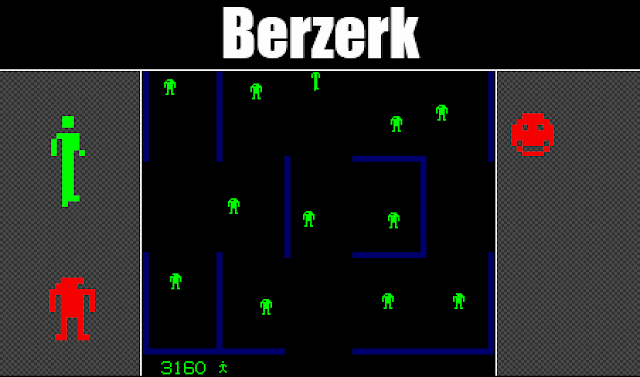Berzerk Review: The Virtues of Bumbling, Trash-Talking Robots
Like many of the games produced in the late '70s and early '80s, the premise of Berzerk is extremely simple: shoot as many robots as you can without getting killed. Your manic avatar scuttles from room-to-room, popping off any robots he can't fool into self-destruction, while being sure to keep a healthy distance between himself and the indestructible Evil Otto. The robots, with their blocky appearance and crudely synthesized taunts, are straight out of a 1950s sci-fi film; ideal targets for any fan of shooters.
The game's nuance is primarily in the artificial intelligence of the robots (which I already spent some time dissecting) because it provides the player with a myriad of options for taking them down. Much of the joy I feel in playing this game is in watching the robots plow into walls or gun each other down in their overzealous attempts to "destroy the intruder". And what's best of all: that joy is earned. It's true that the robots would often destroy one another without assistance from me, but a truly skilled Berzerk player will learn to exploit the AI for maximum effect.
I spend a lot of time in this blog extolling the virtues of simplicity, but allow me to also propose this counterintuitive maxim: sometimes stupid is better. The robots are an ideal "mob" antagonist because they're given just enough intelligence to appear aware of your presence, but not enough to be unmanageable in large groups. Repeated exposure to common robot/wall configurations will train you to march through crowded rooms with minimal risk to yourself, while still challenging you to squeeze into the gaps between their firing lines.
The game's second stroke of genius is the enigmatic Evil Otto. I can think of few things more sinister than an indestructible bouncing smiley face that follows you around and matches you step-for-step as you're exiting a room.
Why is it smiling?! If I were still a kid, I would definitely be worried about this thing showing up from under my bed.
Admittedly, I did have some moments of frustration with Berzerk, not all of which I could chalk up to my own shortcomings. Most notably, the control scheme leaves a bit to be desired, as it only allows you fire from a stationary position or in the same direction you're moving. Berzerk seems like an ideal candidate for double joysticks, á la Robotron: 2084, where one joystick controls movement and the other controls firing. Apparently, Eugene Jarvis was inspired to create the two-joystick control scheme for Robotron after playing Berzerk, so I'm not alone in that opinion.
My other gripe is with the difficulty curve, which shoots up suddenly at about 8000 points. At that point in the game, the robots' bullets greatly increase in speed, and I sometimes found myself getting caught flat-footed right at this transition. A gradual increase in bullet speed would have made the gameplay more even.
Overall, however, Berzerk is a solid entry in the arcade canon that I recommend trying. Whereas most shooters focus on the action, Berzerk adds a strategic element that rewards cleverness as well as reflexes. In particular, modern developers could learn from how they used the robot AI to create a "bumbling mob" that you can exploit in many ways that feel like part of the game.
My Play Summary
I played Berzerk using MAME and a gamepad, with the standard 8-way joystick inputs.
I don't necessarily recommend this setup; in particular, I found diagonal firing to be difficult, even after many games. I'm not entirely sure why this was, but I suspect that a larger, arcade-style joystick would have worked better.
The game was still a lot of fun to play, even though I mostly restricted myself to firing in the cardinal directions. Here are my scores after 65 games:
In total, I achieved 8 high scores and a top score of 12,640. That many high scores is strong evidence that the outcomes were non-random and that I was actually improving.
As with the other two games I've tracked so far, Pac-Man and Asteroids, there continued to be a lot of scatter in my performance even as I got better. The fact that I was still sometimes scoring under 3000 points after 60 games was pretty frustrating, and I don't have a good explanation for it. I felt that I had a pretty good grasp of the AI at that point and could handle most rooms that were thrown at me, at least until the 8000-point mark. I hope to try Berzerk on an arcade cabinet at some point, but unfortunately, the nearest vintage arcade doesn't have this one.





Comments
Post a Comment